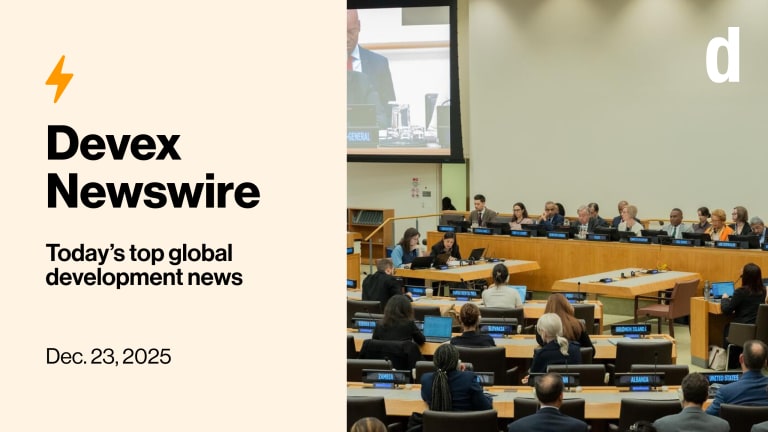
The race for the top spot at the United Nations is still at least a year away, but a bevy of other leadership contests will shape how the world body stands up to today’s crises — and serve as a test of how much influence a retreating United States still wields.
Also in today’s edition: After growing steadily in popularity, cash transfers have hit a bit of a wall, although advocates continue to preach its virtues.
+ Upcoming event: On July 11, we’ll have a discussion with both co-CEOs of the Jacobs Foundation, who will share their bold approach to funding education. Register now. This event is exclusively for Devex Pro members. Not yet a Pro member? Start your 15-day free trial today.
Race to the top
For all the flak that the United Nations routinely gets — from decades-long complaints about its distribution of power to more recent budget slashing from U.S. President Donald Trump — the position of U.N. secretary-general is still a globally consequential and coveted one.
And the jockeying for the job has already begun, my colleague Colum Lynch writes.
Initially, there had been momentum for a woman to head the U.N., which would be a first in its 80-year history. Names floated included Mia Mottley of Barbados; Michelle Bachelet of Chile; Alicia Bárcena of Mexico; María Fernanda Espinosa of Ecuador; and Rebeca Grynspan of Costa Rica.
But the U.S. and Russia have pushed back on the notion that women should be advantaged in the race, encouraging men to throw their hat into the ring.
“The process is really unpredictable right now. I would say it’s probably unlikely that the winning candidate is someone we’re talking about right now,” Anjali Dayal of Fordham University says.
But secretary-general is not the only race in town. Candidates are vying for the top jobs next year at the U.N. Development Programme, the International Telecommunications Union, and the UN Refugee Agency.
A key question mark — as is always the case lately — is the role the U.S. will play, and whether it will be a constructive or a destructive one.
Dayal fears the latter. “The United States, the traditional underwriter of the U.N. system, is today a fundamental destabilizer of the system,” she says. “We are at a point where the organization has never needed visionary, careful leadership more to ensure its survival, but also at a point where the process of selecting that leader makes it really unlikely.”
That leadership is all the more vital because secretary-generals appoint other chiefs within the U.N. that will steer the world body through the turbulent years ahead.
“This is not a race for one person,” says Ben Donaldson, adviser to 1 for 8 Billion, an advocacy group committed to broadening the category of individuals who run the world body. “We see this as a race for the next 40 or 50 U.N. leaders. That’s the sort of number we’re talking about that the next secretary-general will be appointing soon after they come into office.”
Read: The UN’s changing of the guard
Flying blind
Here’s a real-life example of the urgent challenges that current U.N. leaders must contend with — and that future ones will likely have to grapple with as well: The U.N. Humanitarian Air Service is in danger of being grounded due to budget cuts.
Managed by the World Food Programme since its creation in 2004, UNHAS offers passenger and light cargo transport to the entire humanitarian community and is often the only way aid workers can reach the world’s most remote crisis zones, my colleague Ayenat Mersie writes.
Globally, UNHAS — which had a 2025 budget of $307 million that is largely separate from WFP’s food assistance budget — is now reducing its fleet by over 22%.
A WFP spokesperson tells Ayenat that the specific locations and scale of cuts are “dynamic” and will depend on needs assessments and the evolving funding situation. But even as those plans remain fluid, significant reductions are already being felt on the ground.
In Afghanistan, for example, there has been a nearly two-thirds drop in the number of seats available to aid workers on UNHAS flights. And in Sudan — one of the largest and most complex UNHAS operations — flights to five locations have been halted entirely and service scaled down to 10 others, even though over half the population is experiencing high levels of acute food insecurity.
“There is absolutely no reliable commercial alternative for the flights,” Oleh Maslyukov, who heads up UNHAS in South Sudan, tells Ayenat. “Nobody’s going there for any other reason. There is simply no money, no commercial interest.”
Read: UN air service faces cuts, jeopardizing aid access to remote areas
Money talks
Cash transfers have steadily become more and more popular in development circles, but they’ve also faced growing resistance in recent years.
Even before the second Trump administration dismissed the model, there were signs that the sheen was off cash transfers, with reports showing steep drops in 2023 and 2024.
Nonetheless, Isabelle Pelly, the senior policy director at GiveDirectly, one of the world’s biggest cash transfer organizations, said the case for cash is still solid.
“Cash transfers have had a strong body of evidence, building over the last couple of decades,” she said, “showing that it’s not only effective, but also efficient, transparent and, crucially, dignified.”
Speaking at Casa Devex last week on the sidelines of the Fourth International Conference on Financing for Development, Pelly noted that Tom Fletcher, the U.N. humanitarian coordinator, is already convinced of their worth — and cash advocates are working hard to frame the debate in a way that is compelling for the Trump administration. There’s a lot at stake, given that the U.S. funded around 40% of all humanitarian cash transfers last year.
“We do feel that despite the headwinds, there’s really a window of opportunity now that we have to seize,” Pelly said.
Read: What is the future for cash transfers?
Business as usual
“I don’t believe the private sector should step in wholeheartedly and fill a public sector gap.”
— Sanda Ojiambo, executive director, U.N. Global Digital CompactOjiambo reminded the audience at Casa Devex that for all the talk about stepping up private investment to make up for aid cuts, governments bear some responsibility as well.
“I think governments need to be held accountable for commitments,” Ojiambo said. “A lot of financing commitments have been made and they have not been honored, from climate mitigation to adaptation and resilience.”
At the same time, Ojiambo noted that private companies can also play a role in advancing global development goals during a time of aid scarcity.
For instance, “How do you change your operations in-house to be climate smart? How do you look at addressing gender and gender equity within your own business, your leadership, management, and your board,” she said. “How do you address things such as living wages within your supply chain and your value chain?”
And although FfD4 is now in the rearview mirror, Ojiambo said: “I’d love to see a continued collaborative discussion that will allow us to move forward.”
Read: Private sector shouldn’t have to bail out public sector
+ Tomorrow, July 9, we’re hosting a discussion on outcomes-based finance. What happens to this growing market in the wake of all the discussions and debates that unfolded in the Financing for Development conference last week? Join us as we put this question to leading experts in the field. Save your spot now.
In other news
The U.S. has reinstated $6.8 million in aid to Tibet as the country marks the 90th birthday of the Dalai Lama. [Reuters]
Former Florida Representative Mike Waltz is set to testify before the Senate Foreign Relations Committee next week as Trump’s nominee for ambassador to the U.N. [Axios]
Sign up to Newswire for an inside look at the biggest stories in global development.
Search for articles
Most Read
- 1
- 2
- 3
- 4
- 5








